Jason Micheli's Blog, page 62
October 14, 2023
The Only Revolutionary has Death Behind Him
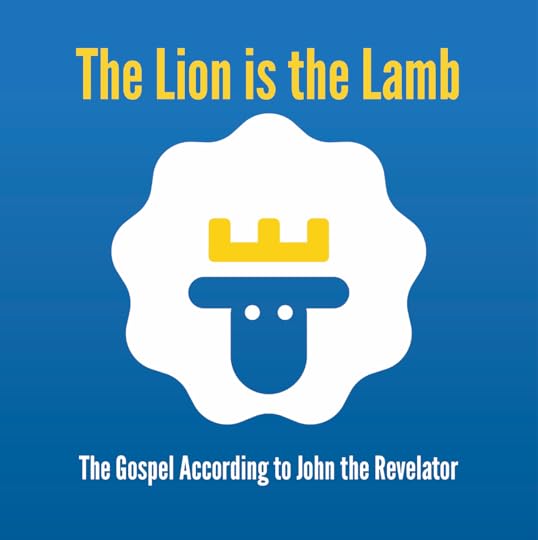
Tamed Cynic is a reader-supported publication. If you appreciate the work, consider joining the posse of paid subscribers!
Here is our latest discussion of the Apocalypse to John, chapters 15-18. If you have any questions, drop them in the comments!
 Get more from Jason Micheli in the Substack appAvailable for iOS and AndroidGet the app
Get more from Jason Micheli in the Substack appAvailable for iOS and AndroidGet the app
October 13, 2023
Preach As If Nothing Has Happened
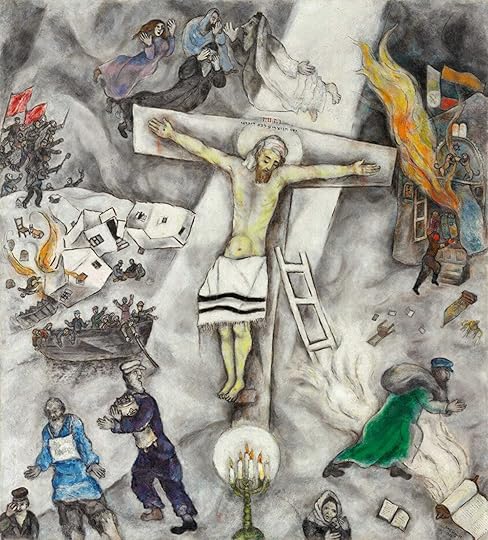
Tamed Cynic is a reader-supported publication. If you appreciate the work, consider joining the posse of paid subscribers!
Philippians 4.1-9
On February 27, 1933, an angry, alienated Dutch construction worker, who was also a Communist activist, snuck into the Reichstag building in Berlin with the intent to burn it all down. Because he was nearly blind, the arsonist only managed to set the curtains ablaze in the Reichstag building. He was apprehended in the act, and immediately it was clear he was lonely and disturbed and had been acting alone. Nonetheless, the Nazi Party’s leadership pounced on the opportunity for propaganda, seizing on the moment to stoke the already raging fears of Marxism and a Russian-style revolution in Germany. In just hours, police began locking up perceived enemies of the state. Nationalists persuaded Paul Von Hindenburg, the Reichspräsident, to suspend the Weimar Constitution until further notice and to exert federal authority over the states in the name of law and order and public safety.
The German Chancellor, Adolf Hitler, leaned into the chaos and fear, addressing German police and officials in the wake of the fire, saying, “230.”
Five days later Adolf Hitler won the national election.
Back up—
A year earlier, in 1932, a young Swiss theologian named Karl Barth had begun teaching a series of underground lectures on preaching. Barth had just been installed as a Professor of Theology at the University of Bonn in Germany. Having never earned a PhD, Karl Barth arrived at the University of Bonn from parish ministry just as the fever of German nationalism was spiking. Though he had taken the position on the condition that he would abstain from political activity, it bothered Barth that the only faculty member at Bonn who had joined the Nazi Party— in 1932, at least— was the professor of homiletics.
Karl Barth did not want students of preaching to learn preaching from preachers whose preaching had been corrupted by nationalism and populism and racism and xenophobia. And so a year before the Reichstag fire election, Karl Barth began teaching an unofficial, uncredited, underground series of lectures on homiletics. Given the context of the course, it’s not surprising that immediately after the election results were clear his hundreds of students came to him for preaching advice.
“Herr Barth, Herr Barth how shall we preach in light of this election?”
Evidently, they had not heard that, in all the Sundays of the first World War, Karl Barth— quite purposely— had mentioned it not once in his sermons, and, to the end of his life, he always regretted the Sunday when he had reflected upon the sinking of the Titanic.
Herr Barth, Herr Barth how shall we preach, what shall we preach, in light of this election?
And Karl Barth advised them:
“Preach as if nothing happened.”
But these are dangerous, unprecedented times, surely they demand a special word, a relevant sermon, timely preaching?!
The only unique time, Barth told them, is the time God has given the Church. The time between Christ’s first coming and the coming again, to proclaim that Jesus is Lord and live in a manner that makes that claim intelligible. Therefore, Barth replied:“No matter what the newspapers tell us preach as if nothing happened.”It’s always business as usual in the Kingdom of God.You will not hear that as the prophetic word Barth intended if you do not know that very soon Barth would be lecturing with Nazi SS officers lurking in the back recording his every word. Soon after, he became a leader of the Confessing Church movement in Germany. Ultimately, Barth’s preaching and teaching as if nothing happened got him exiled back to Switzerland.
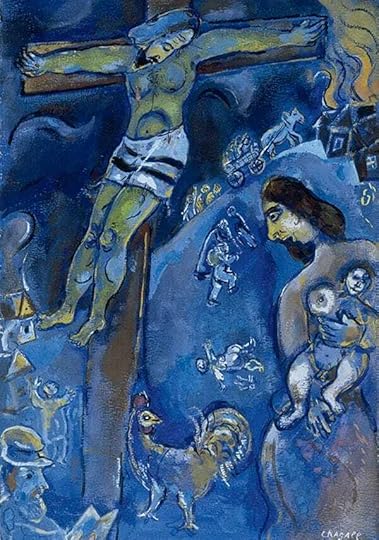
Barth’s admonition that we should preach as if nothing has happened sounds like a cop out if you do not first understand the question its meant to answer.
At the heart of Karl’s Barth business as usual counsel, at the heart— I believe— of Paul’s entreatment in Philippians chapter four, is a question.
For Christians, I believe it is one of the most important questions— top five, easy.This is the question:Is the Church meant to be instrumental to the Kingdom of God?Or is the Church meant to be an instantiation of God’s Kingdom?That is, are the baptized supposed to build the Beloved Community? Or are we charged to bear witness, in word and deed, to the Beloved Community God will bring?
To put the question plain: Are we, as Christians, called to make a difference in the world, or are we called the live in the difference Christ has already made in the world?How you answer that question makes all the difference. And before you answer, remember— the overwhelming majority of Christians since the time of Jesus have been poor and illiterate, oppressed and anonymous. There’s an assumption of privilege that lurks behind the answer that Christians are called to make a difference in the world.
If making a difference in the world is what Christians are meant to do, then most Christians for most of Christian history have lacked the power to do what they’re allegedly called to do.Power is at the heart of the question.
October 12, 2023
God Gone Wild
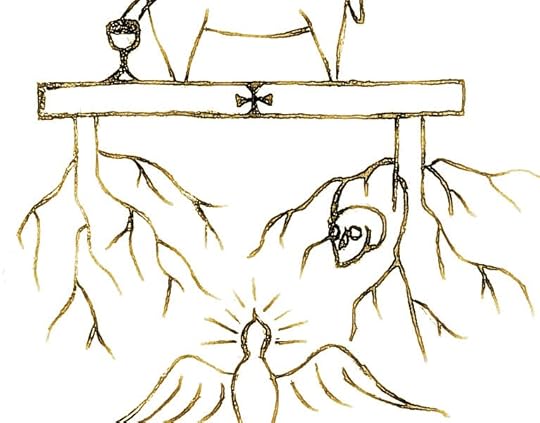
Tamed Cynic is a reader-supported publication. If you appreciate the work, consider joining the tribe of paid subscribers.
Matthew 22:1-14
We can’t backspace our way away from the parable Jesus tells in this Sunday’s Gospel passage. As liberal mainline Protestants, we’ve all been conditioned into believing that Christianity boils down to being nice and doing nice; therefore, if we have any religious convictions at all it’s that God is nice too. And maybe at first you thought that’s where Jesus’ story was headed.
An evite goes out for a great extravagant party, but those in the VIP queue—the fat cats and country club set, the season ticket holders and the keto dieters, the cronies of the rich man—mark the invitation read and forget all about it.
So, the rich man says, “Hey, I’ve already paid the photographer. I’ve got a Costco’s worth of beef tenderloin under the broiler, and the DJ’s already started playing the Electric Slide. Go out beyond the suburbs and bring in the folks from the Halfway House—and don’t forget those guys who loiter around the 7-Eleven too. Let them come into my party. The 1 percent don’t deserve my generosity.”
Probably as Jesus’ story was being read at first you thought you liked it. You like the idea of God going out like Bernie Sanders to the marginalized and the poor and the dispossessed and inviting them to a fine china, cloth napkin, open bar party.
It’s a nice thought.
And it would be nice if Jesus just left it alone right there, which is sort of the way Jesus tells it in Luke’s Gospel.
But Matthew?
I mean—all this festival of death needs to be more terrifying are creepy twin girls, an elevator full of blood, and Jesus with a hatchet saying, “Here’s Johnny.” And maybe a ginger kid too—a ginger would make it scarier.
What gets you about Jesus’ story in Matthew is not the graciousness of the King esteeming the lowly onto his guest list, as in Luke.What gets you is this King’s totally inappropriate and excessive behavior.“Oh, the A-Listers couldn’t be bothered to open the Paperless Post? Some clicked ‘Maybe?’ Really? Well then, I’ll tell you what, Alfred. I want you get some of the hired help and I want you to cross them off the guest list permanently, if you know what I mean. No, that’s right, you heard me correctly, hand and foot. Send them to a place worse than Cleveland! They’ll regret sending their regrets when I get through with them!”
Then, as if the body count wasn’t already high enough, in a flourish only House Lanister could love, there’s Jesus’ finale. Among the good and bad gathered into the King’s party, this panhandling vagrant off Braddock Road makes it past the maître d’ only to get himself shipped off to one of Dick Cheney’s black sites all because of the way he’s dressed.
“You there—yeah you.”
Actually, the word the King uses in Greek is hetaire, which means, basically, “Buster.”
“Hey how’d you get in here dressed like that? We’ve got beluga on ice and Chateau Branaire-Ducru uncorked. This party is black tie and tails only, buster.”
“Well, sir, I was sleeping outside next to the Mission Center trash bins only an hour ago, and they don’t stock formal wear in the church’s coat closet.”
And the “gracious” King responds: “Really? Well then...Bind him, hand and foot! Throw him into the outer darkness where there will be weeping and gnashing of teeth!”
Jesus loves me this I know, for the Bible...
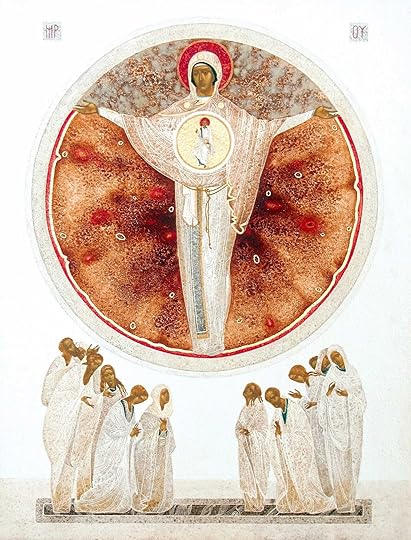
I know you—
It really bothers you that the formerly sweet baby Jesus in golden fleece diapers would tell a story like this to nice, well-mannered people like you. It bothers you to hear the Lamb of God who takes away the sins of the world roaring like a lion at...At what exactly?Failure to RSVP? A party foul? What gives?October 11, 2023
L'Chaim in the Midst of Terrorism

Tamed Cynic is a reader-supported publication. If you appreciate the work, consider joining the posse of paid subscribers.
My friend Liel Liebowitz is an Israeli journalist, author, media critic and video game scholar.
Liel was born in Tel Aviv, immigrated to the United States in 1999, and earned a Ph.D. from Columbia University in 2007. In 2014, he was Visiting Assistant Professor of Media, Culture and Communication at New York University. A veteran of the Israeli Defense Force, Liel is now Editor at Large for Tablet Magazine and a host of its weekly culture podcast Unorthodox and daily Talmud podcast Take One.
I spoke with him recently about the horrific terrorist attack upon Israelis last Saturday and how Christians and Jews in particular can respond.
In the conversation, he shares Tablet’s project to archive the testimonials of Jewish victims and survivors. You can find that record HERE.
L'Chaim,
Jason
(Photo: A building hit by a Hamas rocket attack in south Tel Aviv, Oct. 8, 2023)
 Get more from Jason Micheli in the Substack appAvailable for iOS and AndroidGet the app
Get more from Jason Micheli in the Substack appAvailable for iOS and AndroidGet the app
October 10, 2023
"Death is a Big Part of What I Do"
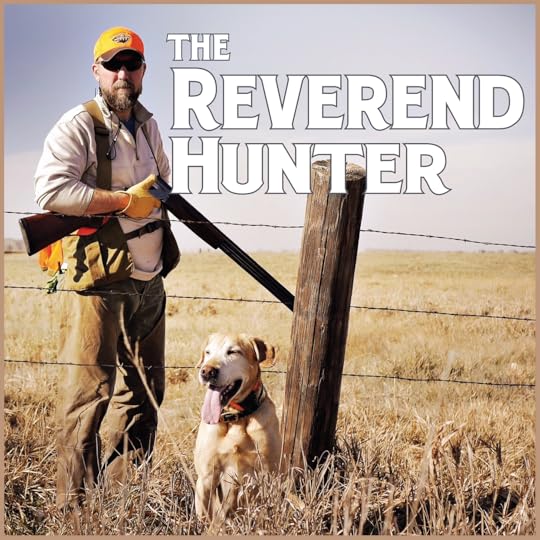
Tamed Cynic is a reader-supported publication. If you like the work, consider joining the tribe of a paid subscribers.
My good friend and fine former editor Tony Jones invited me on his podcast, The Reverend Hunter, to talk about my paddling trip with him on the Boundary Waters of Minnesota.
I talked with Tony about living with cancer, not being able to hear animals scream, the end that will summarize the story of you, our modern cathedrals, when the science ends and the dying begins, discovering that the Bible is interesting, becoming more Christian, the war in Israel, the astonishing pristineness the BWCA, the difference between exercise and labor, and much more.
WHAT IS THE REVEREND HUNTER PODCAST?Outdoorsman and theologian Tony Jones sits down with fascinating people who find transcendence in their outdoors experiences. Hunters and anglers, hikers and kayakers, talk about how they connect to the divine, and to themselves, as they pursue their passions. The conversations are at turns poignant and humorous, illuminating and inspiring. If your spirituality is connected to the outdoors, this is the podcast for you.
 Get more from Jason Micheli in the Substack appAvailable for iOS and AndroidGet the app
Get more from Jason Micheli in the Substack appAvailable for iOS and AndroidGet the app
October 9, 2023
Indigenous Theology for Indigenous People's Day
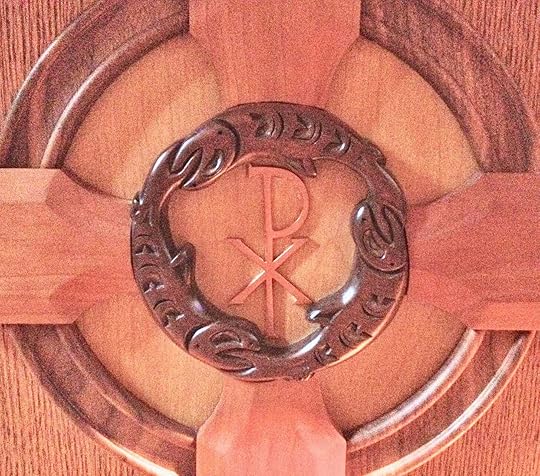
Tamed Cynic is a reader-supported publication. If you appreciate the work, consider joining the tribe of paid subscribers.
Remember, here’s the link to join tonight’s online class on Revelation.
A friend suggested that for Indigenous People’s Day I re-up this recent conversation with Native American theologian Randy Woodley.
In this episode, we discuss Randy’s recent book Indigenous Theology and the Western Worldview. Randy argues that Western theology has settled for a particular view of God and has perpetuated that basic view for hundreds of years, but Indigenous theology originates from a completely different DNA. Instead of beginning with God-created humanity, it begins with God-created place. Instead of emphasizing individualism, it emphasizes a corporateness that encompasses the whole community of creation. And instead of being about the next world, it is about the tangibility of our lived experiences in this present world. The book encourages listeners to reject the many problematic aspects of the Western worldview and to convert to a worldview that is closer to that of both Indigenous traditions and Jesus.
(Image: A Coast Salish–inspired Trinity composed of three dancing salmon that graces the high altar at the Vancouver Anglican Cathedral)
 Get more from Jason Micheli in the Substack appAvailable for iOS and AndroidGet the app
Get more from Jason Micheli in the Substack appAvailable for iOS and AndroidGet the app
October 8, 2023
Either/Or
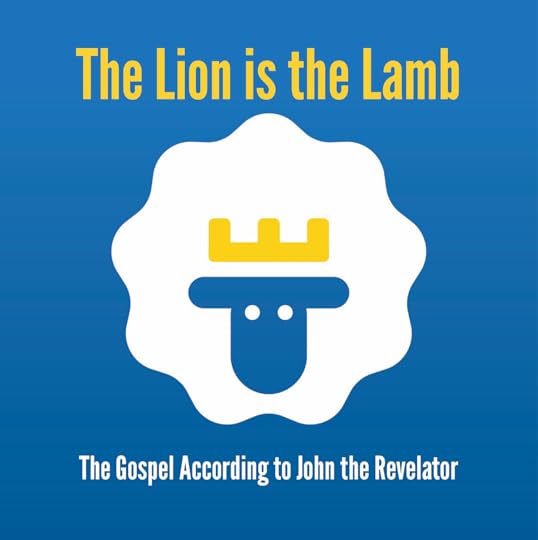
Tamed Cynic is a reader-supported publication. If you appreciate the work, consider becoming a paid subscriber.
Revelation 14.1-13
In the fall of 1935, the Nazi Regime announced the Nuremberg Race Laws. The first law eliminated from German citizenship all Jews and other non-Aryans. The second law, the Law for the Protection of German Blood and German Honor, banned “race-defilement” through mixed marriages and sexual relations. Thus, the Nuremberg Race Laws made the public marking of Jews a necessity.
With staggeringly few exceptions, the churches in Hitler’s Babylon refused to take a public stand against the decrees.
Also by the fall of 1935, the process of Gleichschaltung—the Nazi term for the saturation and coordination of German civic, education, cultural, religious, and political institutions with Nazi ideology—was essentially complete. Under the process of Gleichschaltung, the empire would only consider those churches legal whose pastors agreed to take their theological exams under the authority of a Nazi committee. Again with damningly few exceptions, most churches quickly capitulated to the mandate and accused the few lonely faithful voices in the Confessing Church of preaching politics. This is perhaps the reason why the Nazi regime had largely lost interest in monitoring the church by the fall of 1935.
Put differently—
By the fall of 1935, the church feared Hitler more than she feared her God, who just is the God of the Jews. And no longer fearing God, the church was no longer sufficiently faithful so as to raise the regime’s concern.
Nevertheless!
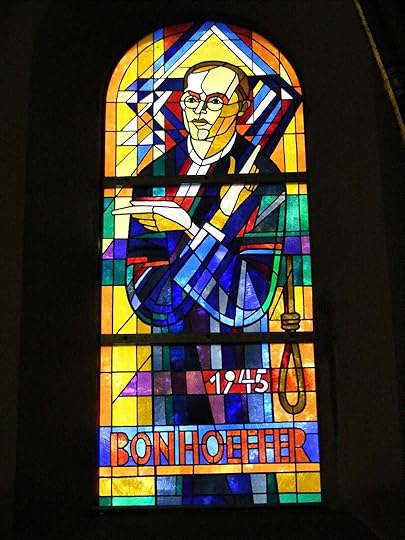
At the same time, at the Confessing Church's underground seminary in Finkenwalde, Germany, on the occasion of Remembrance Day— Germany’s Memorial Day— Dietrich Bonhoeffer preached a remarkably bold sermon. Deviating from the assigned lectionary scriptures for the day, Bonhoeffer chose as his preaching text Revelation 14.6-13.
Bonhoeffer’s hearers were his students.
All of them were frightened.
Many of them were on the precipice of unfaithfulness.
In fact, the Gestapo would soon shutter the Finkenwalde seminary and by the war’s end Bonhoeffer would be martyred on the Führer’s direct order. But in November 1935, on Memorial Day, Bonhoeffer preached on the fourteenth chapter of the Apocalypse and he entitled his sermon, “Standing Strong in Babylon.”
It was one of the few times Bonhoeffer ever made reference in the pulpit to National Socialism.
“What awaits us is not nothing,” Bonhoeffer says the top of his sermon.
The world after death, Bonhoeffer notes, is anything but dead; “indeed, it is quite alive, full of action, visions, words, torments, and bliss—the world after death is actually life to the highest degree.”
This vision of the Last Future is not a spiritual opiate for the masses.It’s a summons.“Let us not offer ourselves false comfort,” Bonhoeffer writes, “by insisting that soon it will all be over; instead, we must recognize that, quite the contrary, soon it will all begin, soon things will become quite serious and quite critical for us.”
Just then, in the very beginning of his sermon, Bonhoeffer puts the purpose of the passage bluntly:
The scripture offers a message of comfort exactly to the extent it shows us how to die.“This text wants to help us prepare for that step into the next world. How do Christians, how does the church-community of Christ learn to die? That is the question to which this text offers an answer. This text proclaims a threefold message of joy to us from that world [after death] as consolation on this Remembrance Sunday and as an aid to our own dying.”
John’s vision shows us how to die in that John sees an angel in between heaven and earth, as though perched in a pulpit, proclaiming “the everlasting gospel.” Even though it may appear at present that the gospel is in demise, the gospel will abide “as the one and only true proclamation of God over all the world.”
Jesus had promised that hell will not prevail against his church.
Now we learn why.
Hell will not prevail against the church because the gospel is eternal, and the angel’s message is the church's mandate.
The everlastingness of the gospel shows us how to die, Bonhoeffer preaches, because it reveals to us the sole basis on which we may assess our lives.
The eventual martyr said to the soon-to-be preachers:
“What will God ask about on that day of judgment toward which we are moving? moving? About God’s eternal gospel: Did you hear and believe the gospel? God will not ask—whether we were great and influential and successful, whether we have a life’s work that can be presented, whether other people respected us, or whether we were small and unimportant and unsuccessful and unappreciated. God will not even ask— whether we were Germans or Jews, whether we were Nazis, or even whether we belonged to the Confessing Church—God will one day ask all human beings whether they believe they can prove themselves before the gospel—and the gospel alone will be our judge. It is the gospel that will separate souls in eternity.”
The gospel is everlasting.
This is critical for us to remember, Bonhoeffer says, because what the prophet also sees is that right up to the instant the angel announces the fall of Babylon, Babylon “was still great, powerful, and bursting with strength—that Babylon was still standing there, invincible in the world.”
In other words, those who follow the Lamb are not promised an easy path. They’re given an eternal promise, the glad tidings of the gospel, by which they can stand strong in Babylon.
Except, notice—The gospel the first angel proclaims is not a promise.It’s a command.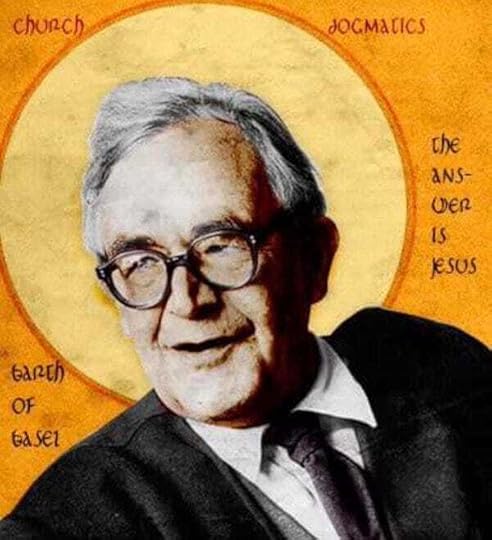
During his one and only lecture tour in the United States, a lay woman in the audience asked the theologian Karl Barth:
“Professor Barth, will we see our loved ones in heaven?”
And Barth flashed her his trademark, irascible smile and said:
“Ja, not only your loved ones.”
Barth could so answer her because it is the word of God that it is the will of God that all shall be saved.
It is the word of God that it is the will of God that all shall be saved.
What the Seer sees, and more importantly what the Seer hears, in this passage is just such an instance of Barth’s assertion. The transition from “the book of the beasts” in chapter thirteen to this second vision of the Lamb marks another startling shift in mood and tone.
The Seer has just seen the unholy trinity— the Dragon and the Two Beasts— making war on the people of God and marking the whole world with the sign of the beast.
What Karl Barth calls “the lordless powers” win.
Or so it appeared.
But then the prophet shifts his gaze, away from the Beast and its Babylon and towards Mount Zion. And at the place where the temple altar once stood, the place long associated in Israel’s memory with divine deliverance from oppression, the Spirit shows the prophet the Lamb. Gathered around the Lamb, John sees, is the church militant— the church resistant; the confessing church. This is why John notes that the 144,000 have abstained sexual relations just as Israel’s soldiers did before battle.
At the place where Israel’s Lord once sat enthroned, the Seer first hears a voice.
The voice is triune.The voice like many waters is Jesus.
The voice like loud thunder is the Father.
And the voice like harpists playing their harps is the Spirit.
John looks to Zion. John hears the voice of the triune God.
And the voice of the three person’d God is followed by a victory song, a song anticipated by the psalms, music of the Last Future.
The prophet shifts his gaze yet again.
Between heaven and earth, “another” angel is unveiled to the Seer, proclaiming “an eternal gospel to those who live on the earth—to every nation and tribe and language and people.”
The angel is preaching to those who’ve made peace with Babylon and happily ensnared themselves to the Beast and, thus, are in unwitting rebellion to the true God.
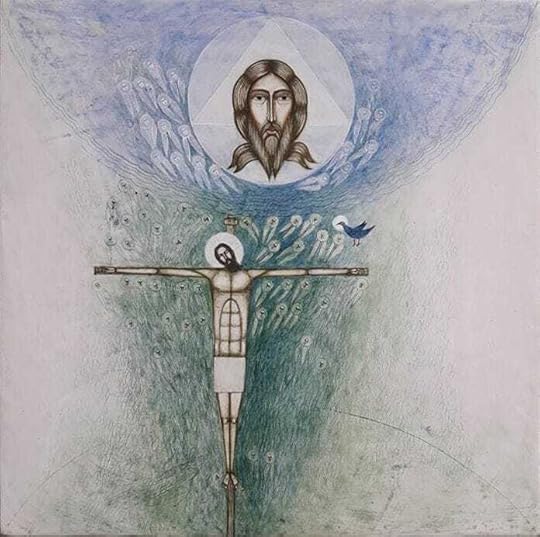
This angel, John reports, speaks with a preacher’s voice:
This is “the everlasting gospel:”“Fear God and give him glory, for the hour of his judgement has come; and worship him who made heaven and earth, the sea and the springs of water.”
Fear God.
Give him glory.
Worship him.
All three— those are all commands not promises.
The eternal gospel is law.Fear God. Give him glory. Worship him who made heaven and earth.
This is not a promise; this is a command.
Actually, it’s the first commandment:“Choose me,” the Lord commands the Israelites, “And eschew all the rest. I am the Lord your God, who brought you out of the land of Egypt, out of the house of slavery.”
The everlasting gospel is just the first mitzah to “have no other gods but God.”
The eternal gospel, like the first commandment, demands choice and faithfulness amid the panoply of possible gods.
In this vein, the greatest commandment is no different than the first.
When Jesus commands us to “love the LORD your God with all your heart and with all your soul and with all your strength and with all your mind…,” the word Lord in Jesus’s command is a proper name.
The Name, Yahweh.
The Lord’s angel preaches to those at ease in Babylon and in awe of the Beast because Israel’s God is intrinsically a jealous God.
Not to worship Yahweh only is not to worship him at all.And because he alone is everlasting so is this gospel.
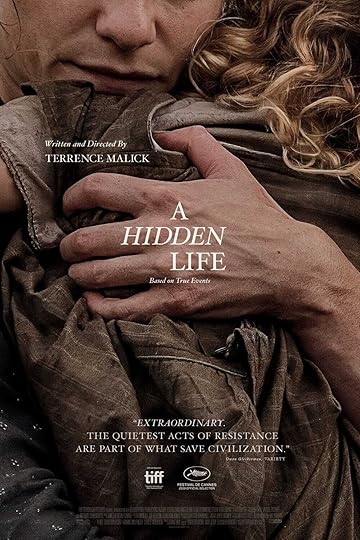
Around the same time Bonhoeffer preached on Revelation 14, another soldier in the church militant was standing strong in Babylon. Franz Jägerstätter was a Catholic peasant in a village not far from Hitler’s birthplace. When the Beast drafted Jägerstätter into the Third Reich, the father of four young girls refused to serve due to his Christian convictions.
Five months later the conscientious objector was put on trial by the Reich Military Court in Berlin. According to the trial records, Jägerstätter testified that it was impossible for him to be a Christian and at the same time a National Socialist.
God had given him the thought, he testified, that:
“There were matters in which one was obliged to fear God more than man.”
When his own defense lawyer pointed out to him that many Christians served the Nazi cause without conflict of conscience, Jägerstätter replied that our unfaithfulness does not mute what the true God has spoken to us.
While he awaited trial, Jägerstätter wrote an appeal to his fellow German Christians serving the cause of party, nationalism and tribalism, and xenophobia.
“Jump off the train,” he pleaded with them, “It’s headed to hell.”
Jägerstätter was martyred two years before Bonhoeffer.
Long after his execution, Jägerstätter’s fellow Austrians kept secret how he had stood strong in Babylon; so that, they could perpetuate the lie that they had only learned of the holocaust after the war. They did not want it known that they had fear another god but God. Not until 2007, when Pope Benedict celebrated Jägerstätter, did his story become widely known.
Hence the title of the film Terrence Malick made about him in 2019, A Hidden Life.
The film includes a scene where Jägerstätter, pondering the many friends who’ve insisted to him that “resistance is futile,” walks into his village church and discovers a painter at work, retouching the church’s frescoes.
Standing on scaffolding, the painter towers over Jägerstätter, and asks him to hand him up a piece of coal.
As he turns to his work, the painter reflects on his project:
“I paint the tombs of the prophets. I help people look up from their pews and dream. They look up and they imagine that if they lived in Christ’s time they wouldn’t have done what the others did. They would have murdered those whom they now adore.”
Then the painter points at frescoes on the ceiling and says to Jägerstätter:
“I paint all this suffering, but I do not suffer myself. I make a living of it. What we do is just create sympathy. We create admirers. We don’t create followers.”
A few moments later, the church bells begin to ring, and the painter takes up a small piece of gold foil:
“Christ’s life is a demand. We don’t want to be reminded of it.”
Later, outside the church, the painters confesses his guilt to Jägerstätter:
“I paint their comfortable Christ, with a halo over his head. How can I show what I haven’t lived? Someday I might have the courage to venture, not yet. Someday I’ll paint the true Christ.”
Fear God. Give him glory. Worship him who made heaven and earth.
Paint the true Christ.
Stand strong in Babylon.
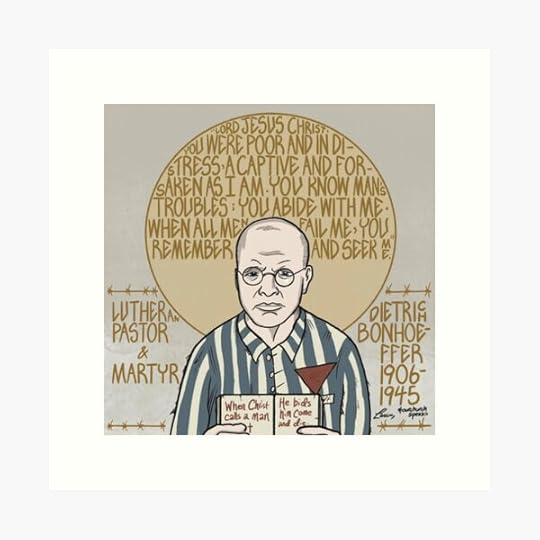
The everlasting gospel is the first law, “Choose me and eschew all the rest.”
In his Remembrance Day sermon, Dietrich Bonhoeffer preached that the same gospel that is “mocked and attacked here and dragged through the muck, and yet loved in seclusion and secrecy and confessed by believers and martyrs of all ages, by countless hearts—the gospel remains eternally. It will abide in spite of it all.”
And then to his already frightened hearers, Bonhoeffer sharpened the Either/Or implicit in the eternal gospel.
Either the God who raised Jesus from the dead is the true God.Or he is not.Either the god who rescued Israel from Egypt is the true and living God.Or all other claimants to deity are false.As Robert Jenson jokes in his autobiography:
“It was not until college that it first occurred to me that my inherited religion claimed to be true— and therefore might be false.”
Neither the eternal gospel nor the first mitzah will broker any compromise.
As Bonhoeffer preached:
“And though there may be thousands of religions and spiritualities and philosophies and opinions and worldviews in the world, and though they may be the most beautiful of worldviews, and though they may well stir and move the human heart—they all collapse when confronted by death; they fall to pieces because they are not true.
Only the gospel remains. And before the end comes it will have been proclaimed to all nations, peoples, and languages over all the earth—though here it may seem that there are many paths, there only one will count, for all the people in the world: the gospel. And its language is so simple that anyone can understand it: “Fear God and give God glory, for the hour of his judgment has come; and worship him who made heaven and earth, the sea and the springs of water.”
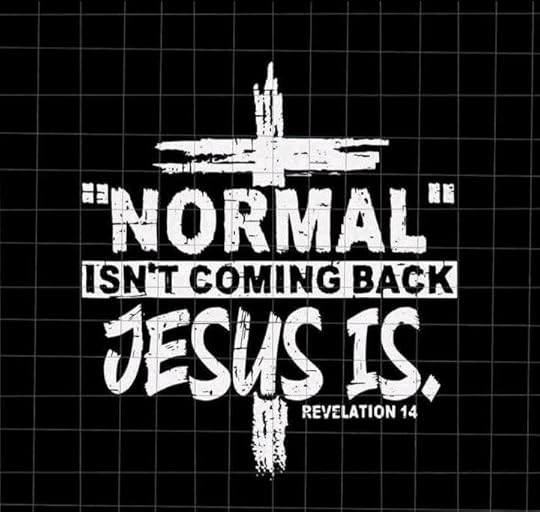
That the prophet John is given to see not the far off future but our every day world with its different Babylons but all with the same Beast, the angel’s message is thus our mandate to proclaim.
Therefore, the question is necessary:What is the gospel supposed to do?As straightforward is the question, we seldom are clear about it; in fact, we regularly confuse the gospel with the gospel’s effects.
Again, what is the gospel supposed to do for its hearers?
Three passages are instructive.
In the Book of Acts, Paul and Barnabas perform a healing in the pagan city of Lystra; thereupon, the pagans confuse them for avatars of Zeus and Hermes. Paul rejects the honor and— offensively— informs them, “We are here to speak the gospel to you; so that, you may turn from such barren deities to the living God.”
In Ephesians, Paul invites the gentile believers to remember that prior to receiving the gospel they were “alienated from the commonwealth of Israel and strangers to the covenants of promise, having no hope and without God in the world.”
Likewise, Thessalonians calls the gospel nothing less than a summons “to turn from idols, to serve the living and true God.”
Simply, the gospel identifies who is the true God.In a world with a smorgasbord of deities, the gospel invites you to turn from the false gods and introduces you to the true God.
This is precisely its good news.And the effects of the gospel, “such things as forgiveness or liberation or empowerment or new creation or inclusion are merely what happen on the way” of this turning from the false gods of our cultures and to the true God of Israel.
So, for example, the worship of the false gods is sin, and therefore my conversion to the true God is forgiveness, and in its unsought and undeserved happening it is forgiveness by grace alone.”
As soon as you can answer the question, “What is the gospel supposed to do?” another question thrusts itself forward:
“Do we all worship the same God?”It’s a genuine question, and the cultural and political and ideological pressure you may feel to answer hastily, “Yes!” (and the likelihood that a “No!” will cause your sphincters to tighten), is itself the kind of power that scripture calls a god.
For that matter, our own Babylon has many gods.We willingly sacrifice our children to a deity called Inalienable Rights. Israel knew that same god and called him Moloch. I can name many people who have broken the fourth commandment, no longer speaking to their parents or their siblings out of loyalty to a political personality. Such loyalty is a barren deity. Martin Luther said that whatever you hang your heart on, there is your god. For many, that god is Family— Children— whose principle form of worship, travel sports, is as exhausting as the prophets of Baal trying to conjure fire.
I’ve been a pastor for over two decades and in that time I’ve known dozens upon dozens of people who have left their church because it did not align with the platform of their political party. But I’ve known exactly zero people who have left their political party because it did not align with the convictions of their church.That’s idolatry.Back to the question, “Do all religions worship the same God?”
Robert Jenson writes:
“Of course, because there is only one true and living God, we may suppose that he receives all prayers and petitions however addressed or misaddressed. But, from this, it in no way follows that we all in our various religions worship the same God. Quite manifestly, we do not. And the Bible anyway is clear: there is the Lord, and there are the Baalim and Asherah, and to worship the Lord is to choose.”
To say that all religions are ultimately the same is to suggest that God is ultimately unknowable and unidentifiable, immune to time, and above history, but this is specifically what the God of Israel is not.
This exclusivity is exactly why the Jews have always suffered persecution.
You cannot worship the God who rescued Israel from Egypt and also the pantheon who tried to keep Israel in slavery.Jesus is Lord means Caesar is not— but not only Caesar.Not to worship the God who raised him from the dead alone is not to worship God at all.As soon as you call Jesus Lord, you drastically reduce the ways you can rightly identify God.As Stanley Hauerwas jokes, you can know we’re in Babylon with a pantheon all our own just to the extent Christians utter nonsense like, “I believe Jesus Christ is Lord, but that’s just my personal opinion.”
It’s a god that produces a sentence like “I believe Jesus Christ is Lord, but that’s just my personal opinion.”
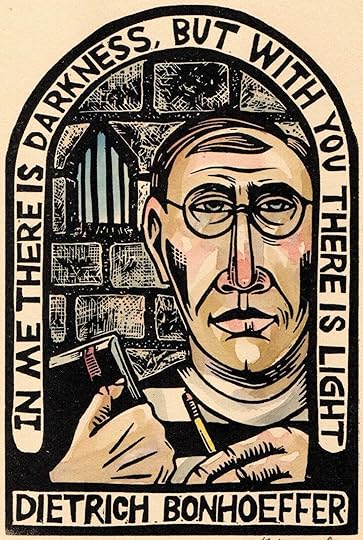
At the end of his sermon, Dietrich Bonhoeffer pointed his frightened hearers to the beatitude in verse thirteen, “Blessed are the dead who die in the Lord…for their deeds will follow them.’”
“Our deeds do not prepare our path to Christ,” Bonhoeffer concluded his sermon, “faith does that—but our deeds follow, the deeds performed in God, in Christ, the deeds for which God prepared us from the beginning of the world…because they belong to us, they will be with us as the eternal gift of the true God.”
Fear God. Give him glory. Worship him who made heaven and earth.
The eternal gospel is law.
A command.
But so is, “Take and eat; this is my body broken for you.”
That too is a command— law.
And yet, nevertheless, it’s gospel.
It’s good news literally because the one who so commands is the true and only living God.
So come and receive him.
So that with him, you too might stand strong and paint a true Christ.
 Get more from Jason Micheli in the Substack appAvailable for iOS and AndroidGet the app
Get more from Jason Micheli in the Substack appAvailable for iOS and AndroidGet the app
October 7, 2023
Bedlam and Heartbreak Abide in Bethlehem

Tamed Cynic is a reader-supported publication. To receive new posts and all content, consider becoming a paid subscriber.
The terrorist offensive by Hamas into Israel earlier today started me to reflect on my recent experiences in Bethlehem in the West Bank.
Here is the piece I wrote during my time there:
As you enter and leave the Orthodox Church of the Annunciation in Nazareth, you can’t help but see— you’re encountered by— a large fresco on the ceiling illustrating the Slaughter of the Innocents. Joseph carries baby Jesus, like an emergency go-bag thrown over the shoulders as an invading army’s artillery gets too close for comfort. In the bottom right hand corner of the scene— soldiers with blood orange swords kill children on a jealous tyrant’s orders. It’s a reminder of the cost that comes with Mary’s “Let it be with me according to thy word.”
Every Feast of the Incarnation I make a point to begin my sermon by reassuring folks that, no matter how disarrayed their life is generally or their Christmas Eve particularly, there is a place at the manger for them. It’s all too easy for those who crowd into church on Christmas to conclude that the bedlam in their lives somehow disqualifies them from befriending the Holy Family. This is a judgment that is as odd as it is commonplace. At least according to the scriptures, the first Christmas was no less clamorous and chaotic for Mary and Joseph than it is today for the brothers and sisters of their child.
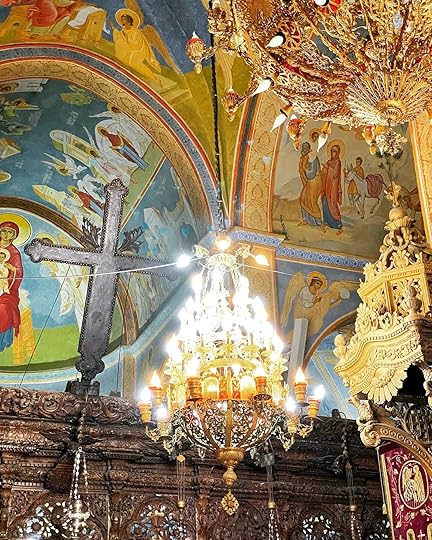
Despite what we sing on Christmas Eve, it was not a silent night. According to the Gospel of Matthew, sometime after the shepherds returned to their flocks and the magi found a different route home, after Mary and Joseph wrapped him in bands of cloth and laid him in a trough, all the other mothers and fathers of sons in and around Bethlehem lay their babies in their cribs and tuck their toddlers into bed.
And while they sing them a lullaby or tell them a Bible story or kiss them goodnight on the forehead, they hear:
The sound of boots stamping down the dusty roads
The sound of doors being knocked on and kicked down
The scraping sound of metal on metal as swords are unsheathed
The chaotic sounds of orders being shouted
And fathers being shoved aside
And mothers gasping
And babies being taken.
Mary and Joseph sneak away across the border with no money to their name. Luke’s nativity tells us about the angels who sing, “Glory to God in the highest heaven.” But Matthew tells us those same skies fill with the cries of mothers and fathers as their sons are silenced forever.
The Gospel of Matthew tells the Christmas story with the steely-eyed recognition that this world often resists our stubborn sentimentality and is frequently and shockingly horrible. It’s a world where despots plot and evil flourishes and the innocent are victims. It’s a world where the poor are powerless and the powerful do whatever they please and long suffered injustices fester.
The unease many churchgoers feel on Christmas Eve is but a distant, thin ripple downstream from the bedlam that marks God’s arrival into the world at Bethlehem.
As Fleming Rutledge puts it, Christ is born with monsters at his manger.
Which makes it both totally fitting and appallingly poignant that the bedlam and heartbreak of his birthplace abides.

Today, the minaret of a mosque stands opposite Nativity Square, seemingly unmoved or unimpressed by the Gospel’s claim that the crèche a block away is the cradle of creation. A busy street laced with street lights and crosswalks snakes past the Church of the Nativity. The honking horns of cars caught in traffic and the whistles of policemen at intersections interrupt the solemn prayers of the pilgrims who all bow in humility as they enter through the short church doorway.
Crossing over from Israel into the Palestinian Territory and the West Bank, I had to go through a security checkpoint to reach Bethlehem.
Graffiti, both righteously angry and winsomely prophetic, covers the West Bank Barrier and stands as an omnipresent backdrop to the gilded leaf altar of the Orthodox Church of the Nativity. Today, the city of Christ’s birth is guarded not by heavenly host but by Palestinian police controlled by the Israeli military.Due to the confusing apartheid-like system of classifying Palestinian Muslims and Christians, only some of the residents of the Holy Family’s city can leave it for the City of David. As a consequence, young men loiter the streets around the site of Christ’s birth with nothing to do, no dreams to entertain or hopes to harbor— unemployment in the West Bank exceeds the worst of the American Depression in the 1930’s. Even the staff at the hotel here in Bethlehem, good jobs to be sure, make less than $700 a month.
Visiting the place of Christ’s birth for the first time, I can’t shake the suspicion that we often drape the Christmas story in sentimentality for self-serving reasons and that the gloss with which we redact the text has victims more serious than the visitors who feel slightly uncomfortable in our pews.
Those who can most identify with the way King Herod thrusts innocents into the gears of geopolitics are precisely those who live in Bethlehem today— a city that remains Christian— caught in the quagmire of the Israeli-Palestinian “conflict.”
At the same time, I can’t avoid the truth that it’s Christians in America who are least likely to identify with the Christians in Palestine.
They can see themselves in Matthew’s frighteningly everyday story while we celebrate it with warm candle glow and tender lullabies. It turns out that, two millennia later, paying homage to the place of his birth is no less complicated than was the occasion of his birth. And honestly, sitting here in the Hotel Saint Gabriel in the West Bank, the situation in Bethlehem feels every bit as hopeless as it must have the day Herod’s soldiers rolled through with their blood orange swords. And then— the silence that ensued.
This surprising, disquieting equivalence between the bedlam of Bethlehem then and now left me yesterday longing for the Church of the Nativity to offer me more. More than a short door that necessitates a work of humility. More than a crèche stone rubbed smooth by the adoring hands of pilgrims. More than a dizzying array of colorful icons and paramount covered walls.
I needed a word.I needed a promise.The Church of the Nativity needs, I concluded, a preacher.
And it doesn’t need to be someone in a collar or robe. It doesn’t need anyone swinging a chain and censor or a standing astride a pulpit. A guy with a sandwich board and megaphone on the street corner would do.
As much as ever, the place of Christ’s birth needs the promise declared at his birth— the promise that the Light yet shines in the darkness and the darkness has not and does not and WILL NOT overcome it.
The promise just has to be true.
Because we, with our alleged free will, have not come up with any solutions.
And as for me, I’ve got nothing.
For me, faith only ever feels like a gift.
 Get more from Jason Micheli in the Substack appAvailable for iOS and AndroidGet the app
Get more from Jason Micheli in the Substack appAvailable for iOS and AndroidGet the app
October 6, 2023
On Becoming a Theologian of the Cross
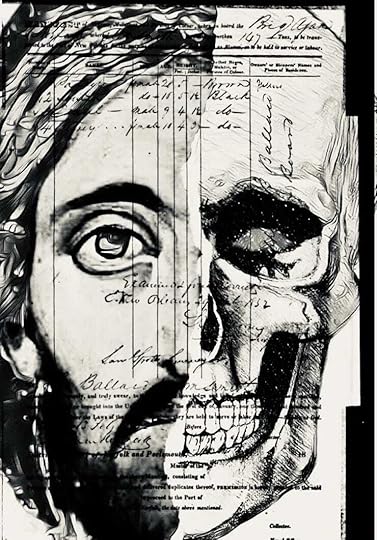
Tamed Cynic is a reader-supported publication. To receive new posts and all content, consider becoming a paid subscriber.
Philippians 3:4b-14
In preaching my way through the last book of the Bible, I’ve been reflecting on the way the prophet John uses the term Babylon to depict the Roman Empire and, indeed, every empire.
Interestingly, the scripture readings assigned for the tradition’s Easter vigil take us to the cross and empty tomb by way of Babylon. The vigil includes the story from the Book of Daniel in which King Nebuchadnezzar of Babylon throws Shadrach, Meshach, and Abednego into an oven.
Bound by the first commandment, the three Jews fail to offer the king the divine fealty he demands.
The king consigns them to a fire, from which we get the word, holocaust.
What made the Babylonians unique among ancient oppressors is that, upon invading and conquering neighbor nations, they did not simply kill the best and brightest of their neighbors. They exiled their enemy’s best and brightest back to Babylon and forced them to become Babylonians.
Babylon gave their prisoners new names and new gods.They made them pagans.And, so Shadrach, Meshach, and Abednego— they’re Jewish exiles, conscripted into the civil service under Nebuchadnezzar, the pagan King of Babylon. They’re Jews, but the names with which they’re named by Babylon pay homage to Babylon’s pagan gods.
Shadrach (his Hebrew name had been Hananiah) is named for the pagan god of the moon.
Meschach (his Hebrew name had been Mishael) is named for the pagan god, Aku.
And Abednego (his Hebrew name had been Azariah) is named for the pagan god of wisdom.
For Jews, for whom the first and most urgent commandment is “You shall have no other gods but the one, true God,” to bear the name of a false god is a grave sin indeed. To carry the name of a pagan god is to expect that the true God has forsaken you. Or, worse, it’s to expect that whatever suffering comes to you has been sent by the God you forsook. In the story, Shadrach, Meshach, and Abednego are denounced for refusing to submit to the gods of Babylon and, by implication, for refusing to submit to the authority of Nebuchadnezzar. So Nebuchadnezzar orders the three exiles gagged, bound, and cast into a fiery furnace but not before the king instructs his men to crank the oven up to seven times its normal heat, and seven— you should note the surprising clue— is the biblical number for perfection or completeness and, thus, it’s a number that foreshadows the presence of God.
The furnace gets so hot that the heat obliterates the guards who come close enough to the fire to toss the prisoners inside but not Shadrach, Meshach, and Abednego.
According to Daniel, King Nebuchadnezzar and his courtiers can see Shadrach, Meshach, and Abednego in the fiery furnace, walking around, unbound and unburned.
What’s more surprising, the bystanders report seeing a fourth person there in the fire.
Shadrach, Meshach, Abednego and who exactly?
“The fourth has the appearance of a son of God,” the counselor reports to Nebuchadnezzar.
The story in Daniel ends with a typical Old Testament flourish when King Nebuchadnezzar, having brought Shadrach, Meshach, and Abednego out of the fire, unsinged, throws off his former affections and declares: “…there is no other god like this Son of God!”
In other words:
There is no other god who meets us in the fire.
There is no other god but the God who meets us in the crucible of suffering.
Despite what so much of our God-talk implies, God is not the passive, inactive, fixed-point center of the universe to whom it’s your job, through prayer and piety, to grow closer.
October 5, 2023
The Leitmotif of Christianity
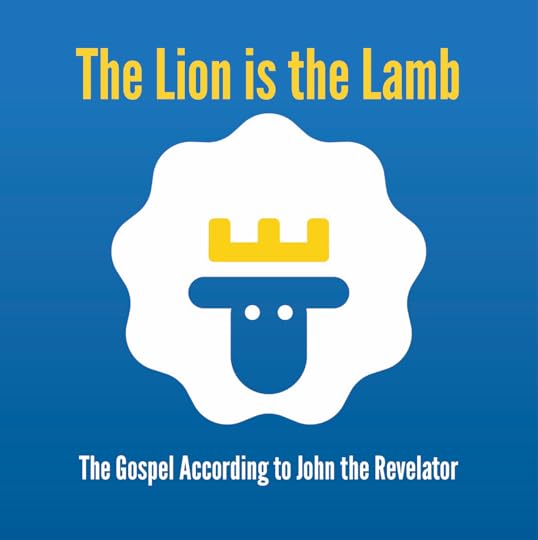
Tamed Cynic is a reader-supported publication. To receive new posts and all content, consider becoming a paid subscriber.
“There is no kingdom in the world where a Christian can live and not rub against the tension revealed in the Apocalypse. And the kingdom where you don't feel it is perhaps more dangerous to the faith.”
Here is our latest discussion of the Book of Revelation, chapters 12-15.
First, a quote relevant to the conversation:
Great is the Baptism that lies before you: a ransom to captives; a remission of offenses; a death of sin; a new birth of the soul. . . . But there is a serpent by the wayside watching those who pass by: beware lest he bite you with unbelief. He sees so many receiving salvation, and is seeking whom he may devour. You are coming in unto the Father of Spirits, but you are going past that serpent.
—St. Cyril of Jerusalem, Catechetical Lectures
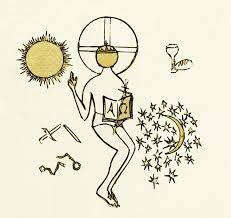
 Get more from Jason Micheli in the Substack appAvailable for iOS and AndroidGet the app
Get more from Jason Micheli in the Substack appAvailable for iOS and AndroidGet the app
Jason Micheli's Blog
- Jason Micheli's profile
- 13 followers



